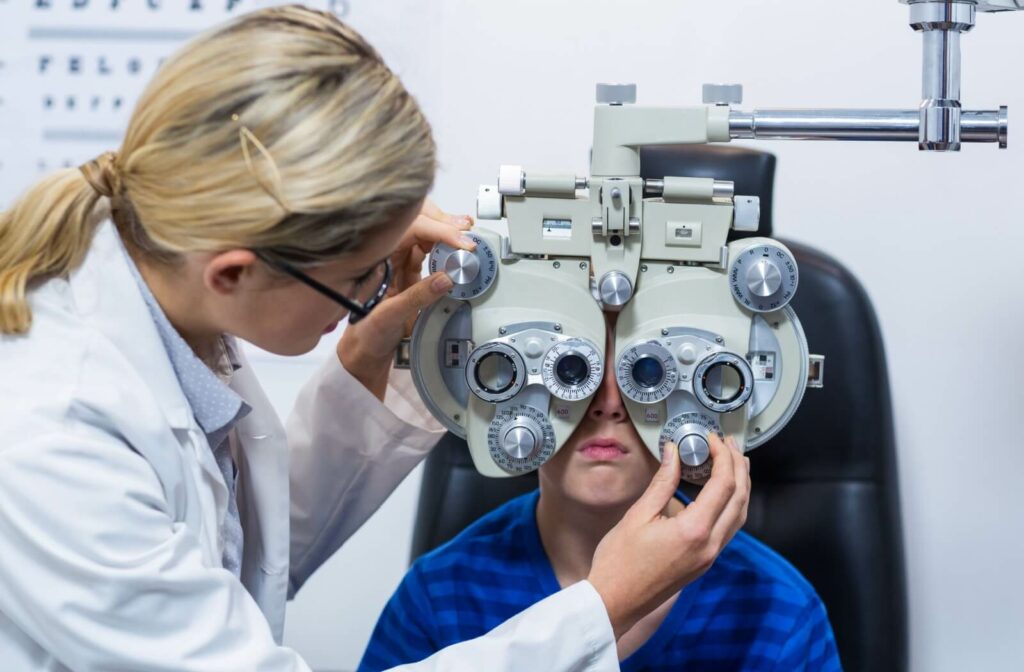Like any part of your body, the quality of your vision changes with time. With time, experience, and adventures, your back might ache every so often (which didn’t happen before) or perhaps you’ve strained a muscle, which requires extra care and attention for proper healing.
Likewise, you might notice changes in your visual clarity with age, lifestyle, and genetics. They might appear subtle at first, but can become more difficult to manage as the problem persists.
Luckily, there are certain signals your eye can send that suggest your vision might be getting weaker, such as:
- Blurry vision
- Frequent headaches
- Squinting
- Double vision
- Light or glare sensitivity
If you’ve noticed one or more of these symptoms, don’t ignore them! Your eyes are trying to tell you something. Routine eye exams can help uncover the underlying concern.
Do Your Eyes Need Help? Here’s How to Tell
If there’s one thing we can count on our body to do, it’s to signal when it needs a little extra care.
The signs might seem subtle, but they are there. Staying alert for them can help you seek timely intervention from your optometrist.
Blurry Vision
It might be an obvious indicator, but blurry vision is a hallmark sign that your eyesight could be getting weaker, likely because of refractive errors, which occur when light entering the eye doesn’t focus correctly on the retina.
Refractive errors usually occur because of changes in the eye’s cornea, lens, or overall length.These structural changes make it difficult for the eye to form a clear image when focusing on objects at near, far, or sometimes all distances.
Frequent Headaches
Experiencing frequent headaches suggests that your eyes are working harder than they should to see clearly. If your vision starts to weaken, your eyes may struggle to compensate, which places added strain on your visual system. Straining, in turn, puts excess stress on your eye muscles, triggering discomfort around your forehead or temples, which leads to recurring headaches.
Squinting
If you’re not seeing as well as you once did, you might find yourself squinting to read road signs or on your phone, to try and focus.
When you squint, you’re partially closing your eyes to lower the amount of scattered light entering your eyes, which temporarily improves clarity.
However, it’s not a long-term solution. Over time, squinting can cause eye fatigue and worsen underlying issues.
Double Vision
Seeing double isn’t the same as seeing blurry. Double vision happens when your eyes can’t work together to form a single, clear image. This can happen for a few reasons:
- Weak eye muscles
- nerve-related issues
- Eye misalignment
Your eyes are a team. When they can’t properly coordinate or focus, this causes a disruption in how visual information is relayed and interpreted, leading to overlapping or duplicated images.
Glare Sensitivity
If bright lights or glare begin to hurt or irritate your eyes, this might be because of increased light sensitivity. It’s often a sign of changes occurring in your visual system.
Glare sensitivity can result from changes to the cornea, retina, or other parts of the eye that influence how light is processed. Most notably, it’s a common symptom of cataracts.

Why Is My Eyesight Getting Worse?
It’s natural to wonder why changes to vision happen. In most cases, your vision changes as a response to actors like age, lifestyle, and the environment.
Age-Related Changes
Our eyes naturally evolve as we age.
Presbyopia is a common example. This is a refractive error associated with the natural loss of lens flexibility that makes it harder to focus on nearby objects. Presbyopia requires the support of reading or multifocal glasses.
Similarly, cataracts and age-related macular degeneration (AMD) can develop over time, affecting clarity and light sensitivity.
Digital Eye Strain
Between smartphones, computers, and tablets, we spend more time on screens than ever before.
Spending lots of time on prolonged near work, like screen time, can cause digital eye strain, leading to muscle fatigue, headaches, dry eyes, and blurry vision.
Genetics & Family History
Some vision problems, like myopia or glaucoma, can run in families. If your parents or grandparents have experienced specific eye conditions, you may be at risk too.
Preventive measures like routine exams and healthy habits can help mitigate the risks of worsening vision and eye health.
Lifestyle Habits
Smoking, an unbalanced diet, or poor hydration can take a toll on your overall health, including your eyes. Nutrient deficiencies, especially in vitamins A, C, and E, as well as omega-3 fatty acids, can interfere with visual health.
Eye Diseases
Conditions like glaucoma, diabetic retinopathy, or retinal detachment don’t always have obvious early symptoms, but can silently affect vision. Regular eye exams can catch these before they progress.
Can Your Vision Improve?
The answer to this question is nuanced.
Although some eye-related changes can’t be entirely reversed, adopting a combination of healthy habits, corrective measures, and good eye care can strengthen and protect your vision:
- Schedule routine eye exams: Eye exams are your first line of defense against weakening vision. Our expert team offers comprehensive services tailored to your needs, from adult eye exams to specialized treatments.
- Invest in updated glasses or contacts: Wearing an accurate prescription helps ensure that your eyes aren’t overworking.
- Protect your vision from screens: Adopt the 20-20-20 rule to reduce eye strain. Every 20 minutes of screen time, look at an object 20 feet away for at least 20 seconds.
- Upgrade your diet: Fuel your vision with leafy greens, carrots, fish rich in omega-3, and citrus fruits. A nutrient-rich diet can work wonders for maintaining eye health.
- Wear sunglasses: UV exposure can damage your eyes over time. Make sure to protect them with 100% UV-blocking sunglasses.
Keep Your Eyes Happy & Healthy
Your eyes work tirelessly for you to enjoy your daily endeavours, and they deserve all the care you can give. Whether you’re noticing a slight change in your vision or just want to stay on top of your eye health, taking proactive steps can make all the difference.
At Total Focus Family Optometry, we’re here to help you maintain crisp, clear vision. Connect with our team to schedule your next routine eye exam.




